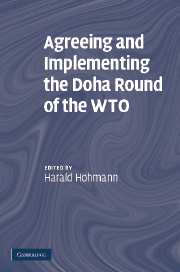Book contents
- Frontmatter
- Contents
- List of Contributors
- Foreword
- Introduction
- The future of the Doha Round
- PART ONE Development policy of the WTO
- PART TWO Trade policy (including competition) and trade facilitation
- PART THREE Reform of the dispute settlement system
- PART FOUR Social rights, health, and environment
- PART FIVE Conclusions
- Index
Introduction
Published online by Cambridge University Press: 23 February 2010
- Frontmatter
- Contents
- List of Contributors
- Foreword
- Introduction
- The future of the Doha Round
- PART ONE Development policy of the WTO
- PART TWO Trade policy (including competition) and trade facilitation
- PART THREE Reform of the dispute settlement system
- PART FOUR Social rights, health, and environment
- PART FIVE Conclusions
- Index
Summary
The World Trade Organization (WTO) is a global success story, not least because of its efficiency in dispute settlement. Where else in the world is it possible to solve disputes within sixteen months (for Panel and Appellate Body)? This is especially astonishing in the case of global trade conflicts. Because of the unique efficiency of the WTO dispute settlement system, more and more cases are brought to the WTO panels. However, an efficient dispute settlement alone is not able to solve the crisis of globalisation, for which non-government organisations (NGO) like Attac or anti-globalisation campaigns are symbols. They underline that the WTO – especially because of its success up to now – needs more and more justification to correspond to the current aspirations of the world community.
Before the beginning of the Doha Round, doubts arose whether the WTO was ready for the inclusion of some of the decisive items of globalisation. The following questions have been asked:
How can we reduce poverty of developing countries, especially of the least-developed countries (LDC)? How can we support capacity building especially for these countries?
Is special and differential treatment a must to secure the development goals of the least-developed countries? If so, what does it mean in practice?
Under what conditions will improved access to agricultural and industrial goods and improved access to services be a win–win situation for industrialised and developing countries alike?
How must trade policy (improved access to agriculture, industrial goods, services) and ‘rules’ (e.g. on subsidies, anti-dumping) be improved to support trade liberalisation and fairness at the same time? Must competition become a subject of the WTO and what role does trade facilitation play?
[…]
- Type
- Chapter
- Information
- Publisher: Cambridge University PressPrint publication year: 2008



